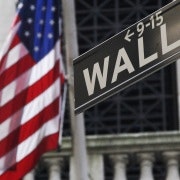Wall Street is up to its old tricks again
You’d think after bringing the global economy to its knees just a few years ago, Wall Street would clean up its act.
That would be the safe trade: enact reforms internally, lower risk and play by the rules, lest new rules be forced upon the industry.
But why be safe when you can bet big and get rich?
What’s happened instead is the opposite. If anything, bankers and brokers defiantly have hardened in their quest for bigger and bigger paydays. Wolf of Wall Street? What we’re seeing is a pack of wild dogs that continue to use any means necessary to line their pockets no matter the fines, convictions and settlements that regulators throw at them.
Consider that, in just the past week, a trader convicted of fraud cited his bank’s bonus culture as motivation behind his crime; a major investment bank was accused of failing to live up to its own promise to root out cheaters from its trading systems; and three powerful, too-big-to-fail institutions have ramped up the use of risky derivatives to goose returns.
Let’s begin with the trader. John Rusnak was a currency trader for the US arm of Allied Irish Bank PLC when he made a series of bad bets that cost the bank $US291 million. He was convicted in 2002 for unauthorised trades and served five years in jail. This week he told a radio station that Wall Street’s bonus culture created a huge incentive to make the bets and that, for supervisors, profit was "always a reason to look the other way".
Does Rusnak believe anything has changed? "I don’t see any significant change or reform of the financial markets." And who could argue? A global coalition of regulators are investigating what they believe is a massive price-manipulation scheme in the same currency markets in which Rusnak worked.
Manipulators, or those seeking an edge against regular investors, aren’t confined to sophisticated currency markets. This week, Eric Schneiderman, the New York state attorney general, accused Barclays of reneging on a promise to get rid of suspect players in its proprietary 'dark pool' trading platform.
Schneiderman, who is investigating the dark pool industry amid accusations that the platforms can be manipulated to take advantage of regular investors, said Barclays’ electronic-trading chief promised in 2012 to root out suspect high-frequency traders. His office, which sued Barclays last year, said the bank has shown a pattern of “fraud,” “lying” and “deceit.”
Barclays denies the accusation and says the lawsuit is unjustified.
Even within legal boundaries, Wall Street seems tied to its old ways. After abandoning risk-management practices in the run-up to the mortgage debacle, some institutions don’t seem to have learned their lesson.
Credit Suisse, which earlier this year pleaded guilty to criminal charges and took a $US528m charge while at the same time handing its CEO a 26 per cent raise, is raising the ire of regulators again. This time, the Zurich-based bank is accused of handing out too many leveraged (read risky) loans to corporate buyers.
Credit Suisse this year has underwritten or sold close to $9bn of the loans for the purposes of leveraged buyouts, giving it a market-dominating 13.4 per cent share, according to data provider Dealogic. This isn’t to pick on Credit Suisse, though its lending is relatively outsized in the industry. Everyone, after all, is doing it. Leveraged lending is just shy of pre-meltdown 2007 levels.
Down the Street at Citigroup, leveraged loans may not be as big of a problem as its use of derivatives. In the past five years, use of the securities that Warren Buffett called “weapons of mass financial destruction,” have soared 69 per cent, according to a Bloomberg report. To make matters worse, 92 per cent of Citi’s derivatives don’t trade on exchanges, making them hard to price, and are linked to interest rates, which can turn south in a hurry should there be a surprise.
Citigroup says it needed to get so heavily into derivatives to meet client demand, according to the report.
The lure of exotic derivatives and swaps continues to entice Wall Street, which sued regulators over new rules that curbed their use. The industry lost its bid in a decision this week that gave the Commodities Futures Trading Commission authority to regulate the business overseas.
Likewise, across the country over on Wall Street West, Bill Gross, the co-founder of Pacific Investment Management Co, disclosed that this year he used $45 billion in futures contracts to boost returns at its lagging bond funds. Its flagship Pimco Total Return Fund trailed more than half of its peers as of September 15.
Gross, who parted with popular chief executive and co-chief investment officer Mohamed El-Erian in January, is under pressure to lift Pimco’s fund returns. Gross reportedly made $US200m last year.
Ultimately, Gross, Pimco, Citi and Credit Suisse may never see their risky ventures turn sour. Perhaps Barclays has shored up its dark pool and the suspicions about currency-market manipulation are overblown. Maybe all of this is the work of overzealous regulators.
Or maybe Wall Street is again playing fast and loose with the stability of the financial system: disproportionately rewarding risk-taking, cutting corners and betting that this time they’ll get away with it.
Come to think of it, that’s probably the safest gamble of all.
This article was originally published at Marketwatch. Reproduced with permission.
















